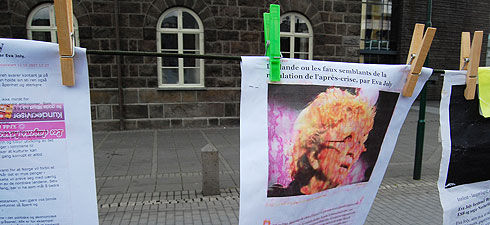Resentment is growing not only towards those who ran up the debts – Iceland’s bankrupt Kaupthing and Landsbanki, with its Icesave accounts, and the property owners in the Baltic and central Europe – but also towards the foreign advisers and creditors who put pressure on these governments to sell off the banks and public companies to insiders. Support in Iceland for joining the EU has fallen to just over a third of the population, while Latvia’s Harmony Centre party, the first since independence to include a large segment of the Russian-speaking population, has gained a majority in Riga and is becoming the most popular national party. Popular protests in both countries have triggered rising political pressure to limit the debt burden to a reasonable ability to pay, notes Michael Hudson in the Financial Times.
This political pressure came to a head over the weekend in Reykjavik’s parliament. The Althing agreed a deal, expected to be formalised on Monday, which would severely restrict payments to the UK and Netherlands in compensation for the cost of bailing out their Icesave depositors. Iceland’s payments will be limited to 6 per cent of growth above 2008’s gross domestic product. If creditors thrust austerity on the Icelandic economy there will be no growth and they will not get paid.
Will Britain and the Netherlands accept Iceland’s condition? Trying to squeeze out more debt service than a country could pay requires an oppressive and extractive fiscal and financial regime, Keynes warned, which in turn would inspire a nationalistic political reaction to break free of creditor-nation demands. A pragmatic economic principle is at work: a debt that cannot be paid, will not be. What remains an open question is just how these debts will not be paid. Will many be written off? Or will Iceland, Latvia and other debtors be plunged into austerity in an attempt to squeeze out an economic surplus to avoid default?
The latter option may drive debt-laden countries in a new direction. Eva Joly, the French prosecutor brought in to sort out Iceland’s banking crisis, warned this month that Iceland would have little left but its natural resources and strategic position: “Russia, for example, might well find it attractive.” The post-Soviet countries are already seeing voters shift away from Europe in reaction to the destructive policies the EU supported.
Something has to give. Will rigid ideology give way to economic reality, or the other way round?
DEMOGRAPHY
Comfort in the crisis: Iceland's baby-boom
A little more than nine months after Iceland's banking sector collapsed and dragged down the island's economy with it, Iceland is experiencing a baby boom, reports theFinancial Times. The number of births has increased by 3.5 % over the same period last year, and if the level of deliveries is sustained throughout 2009, "the country is on course to record the most annual births for half a century." Different commentators have suggested a variety of reasons for the spike, explains the FT. Some believe that Icelanders are seeking comfort in relationships and family life amid the financial crisis, others point out that rising unemployment has left people with more time to procreate. However, everyone has hailed the arrival of the "kreppa babies" (crisis babies), as a sign of optimism for the future.
Was this article useful? If so we are delighted!
It is freely available because we believe that the right to free and independent information is essential for democracy. But this right is not guaranteed forever, and independence comes at a cost. We need your support in order to continue publishing independent, multilingual news for all Europeans.
Discover our subscription offers and their exclusive benefits and become a member of our community now!












